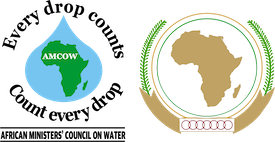Dr Rashid Mbaziira
Welcome to the AMCOW Website. Allow me to invite you to join our drive to transform AMCOW into an effective mandated organ of the African Union’s efforts to assure water security in Africa.
The role water management plays in ensuring human and environmental health; economic production; and climate resilience cannot be overemphasised. In this context, AMCOW’s mandate places the Secretariat at the forefront of initiatives to realise Aspiration 1 of the African Union Agenda 2063, which is: “a prosperous Africa based on inclusive growth and sustainable development”.
Among the seven goals of this aspiration are ambitions for:
- a high standard of living, quality of life and wellbeing for all citizens;
- healthy and well-nourished citizens;
- transformed economies;
- modern agriculture for increased productivity and production;
- blue/ ocean economy for accelerated economic growth; and,
- environmentally sustainable and climate resilient economies and communities.
Safeguarding sustainable access to adequate quantities of acceptable quality water for health, agriculture, livelihoods, production and the environment is a key success factor of those ambitions. By inference, therefore, ensuring water security plays a pivotal role in ongoing initiatives to achieve the goals of Agenda 2063.
AMCOW’s leadership of this vital function has to be demonstrated by the ability to refocus the agenda on ensuring water availability. Improving water access is essential for our Member States to respond to the COVID-19 pandemic; restore growth; and build resilience.
Therefore, during my tenure, our primary focus will be on leveraging political support; mobilising partnerships; and facilitating the application of knowledge and information to support:
- action to meet water demands for all – and here I have to emphasise the element of ensuring equity and equitability in water, sanitation and hygiene services provision;
- action to ensure availability of water for economic production, particularly in the industry, energy, and agriculture sectors;
- action to reduce disaster risks from such water-related hazards as floods, droughts and pollution; and,
- action to enhance climate resilience.
A key priority is to raise the profile and value attached to water in national systems for economic planning and development.
Domestic allocations and investment into the water and sanitation sector are well documented as being incommensurate to the requirements to release Africa’s development potential. In turn, this has major implications for our Member States’ agenda to eradicate poverty; end hunger; ensure good health and well-being; and ensure climate-resilient development.
From that perspective, a significant number of Member States are off-track to achieve the targets of the Africa Water Vision 2025 and, indeed, the SDGs come 2030.
Our response will be centred on advocating for making the principles of valuing water the backbone of the action framework for the post-2025 Africa Water Vision. Application of these principles holds promise for highlighting the vitality of water security and sustainable sanitation to Africa’s agenda for economic growth and social transformation.
This calls for establishing economic accounting for water as a framework underlying the development, utilisation and management of water resources in Africa. In so doing, water use information will be directly linked with its contribution to economic production. In turn, the spotlight will be shone on the opportunity cost of incommensurate funding to the sector as a first step to strengthening water security.
In the same token, we are committed to ensuring that the post-2025 Africa Water Vision is aligned to, and is adopted as an implementation framework of Agenda 2063. A key element of this commitment is to fulfil AMCOW’s reporting obligations to the Assembly of the Heads of State and Government of the African Union. The African Water and Sanitation Sector Monitoring (WASSMO) reports are a useful tool for mobilising evidence-based action to achieve the goals of Aspiration 1 of Agenda 2063.
Over the next four years to the final milestone of the Africa Water Vision 2025, we will collectively work to strengthen the WASSMO system. The intent is to utilise the system to evaluate the extent to which the targets of the Africa Water Vision have been achieved. Starting with a report to the AU Summit on Water and Sanitation in Dakar in March 2022, the information will be used to plan for the transition to the post-2025 era.
With support from the Member States and partners, we will fully operationalise related AMCOW Decisions to broaden the scope of WASSMO to provide information on AMCOW Decisions to broaden the scope of WASSMO to provide information on:
- first, sector financing for water resources development, utilisation and management;
- second, progress in implementing the transboundary water projects under the Priority Action Plan of the Programme for Infrastructure Development in Africa – PIDA-PAP; and,
- third, progress in delivering on the N’Gor Commitments on Water Security, Sanitation and Hygiene.
These strategic goals will define the tenure of my leadership of the AMCOW Secretariat. They will be achieved with:
- the guidance of the policy organs of AMCOW and the African Union;
- the ownership and involvement of the Member States; and,
- the invaluable support of our partners, stakeholders and technical structures.
Collectively, we will institute the mechanisms to count every drop and make every drop count in the pursuit of the goals of Agenda 2063.
I thank you.


Mandate Area


Convening


Stakeholder Engagement









